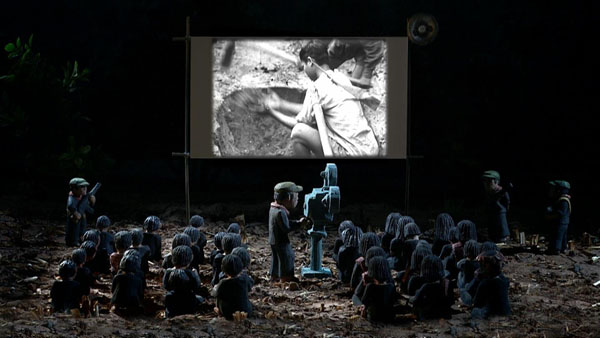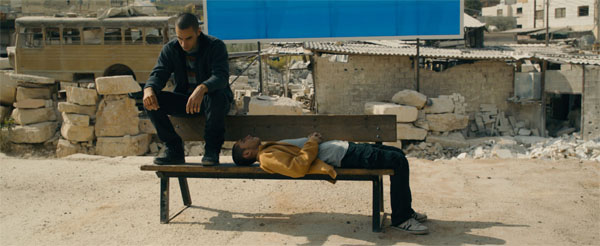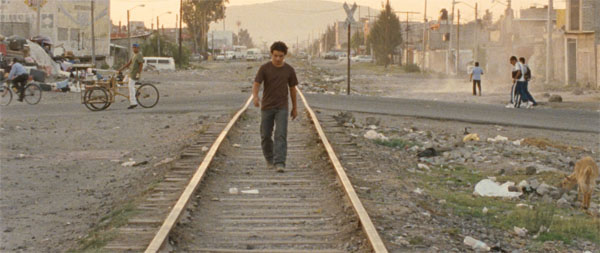“Dear Thierry, dear Gilles Jacob, dear Cannes Film Festival,” writes Thomas Vinterberg, addressing artistic director Thierry Frémaux and the festival’s president, “Thank you for giving us the responsibility of choosing and celebrating films from a very powerful Certain Regard selection 2013…. Clay figures, extreme beauty, violence, homosexual blow jobs, systematic humiliation of the human kind, Léa Seydoux’s legs, great Brando imitations are just some of the unique images that will follow us for a while.”
Jury president Vinterberg and his other jury members—Zhang Ziyi, Ludivine Sagnier, Ilda Santiago, and Enrique Gonzalez Macho—have presented the Prize of Un Certain Regard to Rithy Panh’s The Missing Picture.
The Jury Prize goes to Hany Abu-Assad’s Omar.
The Directing Prize: Alain Guiraudie for Stranger by the Lake.
A Certain Talent Prize goes to the ensemble cast of Diego Quemada-Diez’s La Juala de Oro (The Golden Cage).
And the Avenir Prize goes to Ryan Coogler’s Fruitvale Station.
We’ve already made note of what the critics have been saying about The Missing Picture and Stranger by the Lake (click the titles to see the roundups), so now we turn first to Omar. In a dispatch to Grantland, Wesley Morris writes: “What Abu-Assad does here is muss the tidiness and contrivances of his Paradise Now. The new film focuses on the fallout after three friends murder an Israeli solder, and one, Omar (Adam Bakri) is tortured, then conscripted by a Mossad agent (Waleed Zuaiter) to rat on his two friends. What follows a rather basic first act is a series of well-done betrayals in which the three friends and the sister of one are mired in distrust. What you miss in most depictions of the Palestinian situation is the sense that the conflict frays Palestinians. The separation wall, which is a pivotal device here, segregates them from each other. Abu-Assad makes clear the psychic oppression of occupied life while suggesting that, strategically, there’s an effective Israeli plan to turn the men it captures into rats.”
“Films set against the background of the ongoing Israeli-Palestinian conflict more often have plots that can be seen in simple black and white terms, with the Israelis as the villains,” writes Barbara Scharres at RogerEbert.com. “The occupiers are indeed the villains in Omar, but the story goes deeper in creating a chain of wrongs and perpetrators that grow out of twisted circumstances of the occupation and the impossible demands placed on what were once clear-cut bonds of family and friendship.”
“Deliberately ambiguous in how it approaches the inexorable nexus of violence, Omar will trouble those looking for condemnation rather than the messiness of humanity,” agrees Jay Weissberg in Variety.
“There will be those who find the film’s punch-in-the-stomach ending a disturbing apology for violence,” writes Deborah Young in the Hollywood Reporter, “and others who will read it as another tragic outcome of events in the Middle East.”
Update, 5/26: Joumane Chahine in Film Comment‘s second Cannes roundtable: “In a very quiet, subdued, almost invisibly creeping way, it was to me the most transgressive film I saw. That’s because, and I don’t know if I’m the odd one reacting to this, but it’s the first Arab film I’ve ever seen I think where most of my sympathy went to the Israeli.” Gavin Smith: “Well, what was interesting to me about Omar was the way in which it takes someone who, very early on in the film, participates in a killing—a sniper attack on an Israeli military post—and yet the film steadily builds sympathy for someone who, at least from a Western point of view, is reprehensible…. I think it’s a strong film.” Chahine: “I think it’s interesting that you, the Westerner, found it interesting that you had sympathy for an Arab boy who participates in a shooting, and I, the Arab, had sympathy for the Israeli agents. So in a way, our conclusions about it are symmetrical.”
The Guardian‘s Peter Bradshaw on The Golden Cage: “Even when Ken Loach doesn’t have a film in competition in Cannes, his influence is still keenly felt. Spanish director Diego Quemada-Diez was a camera assistant on Loach’s Carla’s Song, Land and Freedom, and Bread and Roses, and there is something very Loachian in this tough, absorbing, suspenseful drama… about three Guatemalan kids trying illegally to cross the Mexican border into the US. He has avowedly stuck to Loach’s realist directing style: shooting in narrative sequence and using a semi-improvisatory approach on location. It is interesting that while British directors such as Andrea Arnold and Clio Barnard have hyper-evolved the Loach idiom into beautifully realized and photographed dramas of naturalism, Quemada-Diez is arguably closer to the gritty, grainy original.”
“It’s not always clear what’s happening in any given scene, particularly early on,” writes Variety‘s Peter Debruge, “but the disorientation appears to be deliberate, as the director immerses auds in an odyssey far tougher than the participants could ever imagine: attempting to climb aboard a train and ride it nearly 1,200 miles to the US, an undertaking full of twists and setbacks…. Although Quemada-Diez also allows for some essential bonding en route (nothing as archetypal as Sin nombre’s wrong-side-of-the-tracks romance), the helmer takes a largely unsentimental approach. His strategy is to keep audiences guessing, something he does by never ensuring the characters’ safety. In retrospect, the pic’s final tragic steps seem inevitable, and yet the outcome is virtually impossible to predict, even as it explains the surreal falling-snow motif subtly interwoven throughout—a sight completely alien in Guatemala and now imbued with unforgettable significance.”
“Making much use of available light, which pays off particularly in some redolent twilight shots, [Quemada-Diez] has also (successfully) cast non-actors from Guatemala in the film’s three leads,” notes Screen‘s Fionnuala Halligan.
For Neil Young, writing in the Hollywood Reporter, The Golden Cage is one of “the more underwhelming directorial debuts unveiled at this year’s Cannes,” a “lukewarm examination of a hot-potato political issue.”
Update, 5/26: For Rowena Santos Aquino, writing at Next Projection, “the handling of this story—the direction of the young actors, the intimate mobility of the camera as if constituting a fourth character, the pared down dialogue that revolves around exchange and subterfuge so that one path that one thinks one has decided to take ends up being one chosen for him/her—is very much singular and absorbing…. Another aspect of the film that makes it different from others of its kind is that it does not indulge in sentimentality. The film follows these youths with an unflinching and persistent eye, as if it were just as determined as they are to get to Los Angeles.”
Cannes 2013 Index. And you can watch over 100 films that have seen their premieres in Cannes right here on Fandor. For news and tips throughout the day every day, follow @KeyframeDaily on Twitter and/or the RSS feed. Get Keyframe Daily in your inbox by signing in at fandor.com/daily.






